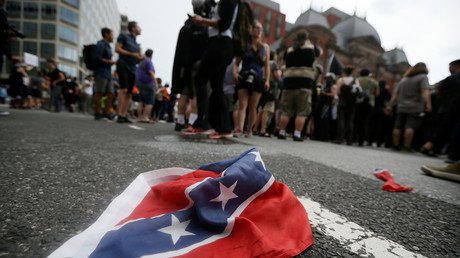Trust each other or die? US political divide might be bad for your health
Calling the United States a divided nation is not a radical notion. But aside from fuelling endless hours of cable TV and social media debate, America’s culture wars might actually be shortening people’s lives.
The political and cultural divide in the US is widening, with sometimes deadly consequences. Saturday saw an anti-Semitic gunman murder 11 worshippers at a Pittsburgh synagogue; last week saw a right-wing kook mail a series of crude homemade explosive devices to prominent Democratic officials; and this summer was marked by the left violently confronting Republican officials in restaurants, airports, and at their own homes.
Despite token calls for unity, all sides have accused each other of enabling and encouraging the violence. In the wake of the latest incidents, President Trump blamed the liberal media for stoking the “flame of anger and outrage” in US society, while many in the media blamed Trump’s anti-media, anti-Democrat rhetoric.
This deteriorating political climate might be bad for people’s health, according to a study by Swedish researchers, published last week. After examining over 25,000 participants, researchers found that low levels of social trust can shorten life expectancy by as long as ten months.
The researchers surveyed more than 25,000 Americans between 1978 and 2010, first measuring their trust in their fellow man by asking them questions like “Generally speaking, would you say that most people can be trusted, or that you cannot be too careful in dealing with other people?”
The team then checked which respondents were still living in 2014, and found that over 6,000 had died. Respondents who showed low levels of trust were more likely to have passed away than their more trusting compatriots. The results were broadly the same between men and women, and across every socioeconomic category.
Distrust, the study says, increases friction in social interactions, and contributes to psychosocial stress, which leads to health problems and an increased risk of dying.
Turn off FOX & CNN for a little. Listen to other news stations.Go outside and talk to other human beings. Regardless of political party, religious affiliation or sexual orientation.It might surprise you how kind most people are.Don’t let political rhetoric to divide us.
— Elizabeth Louise (@LzbthLouise) October 25, 2018
Like the common cold, you can catch this sickness off your neighbors. If you live in a distrustful city, researcher Alexander Miething wrote, “your risk of dying is higher than in places with more community trust.”
The study also found Americans to be an inherently distrustful bunch, with 62 percent more likely to distrust than trust their neighbors. The situation has deteriorated over time too. 43 percent of respondents trusted others in the 1980s, compared to only 34 percent in the 2000s.
To those following US politics in recent years, the decline in trust will come as no surprise. The Swedish scientists are not the first to issue dire warnings on the state of civil society in the US. A recent Michigan State University study warned that the hyper-polarized political landscape is going to get much worse.
Where this leads is anyone’s guess, but several prophets of doom have made severe predictions. Republican Congressman Steve King warned this summer that the US is lurching towards a second Civil War. University of Tennessee Law Professor Glenn Harlan Reynolds argued in a USA Today column that this new war is already “well underway,” while political scientist Thomas Schaller wrote that America is “at the beginning of a soft civil war.”
Plenty of Americans agree. According to a Rasmussen poll, 31 percent of US voters say it’s “likely” that the US will descend into civil conflict in the next five years.
The Swedish researchers stopped short of making such apocalyptic conclusions, but did wag their fingers at politicians. “Decision makers,” they wrote, “should consider any impact that policies may also have on trust, with the view to halting or even reversing this decline.”
Like this story? Share it with a friend!















